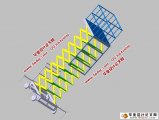可拆式料位计检修平台的设计(CATIA二维三维图)(任务书,开题报告,论文说明书8000字,CATIA二维三维图)
摘要
升降台主要应用于物流过程中高度差之间的货物输送、传递等,如与流水线、专用设备等配套使用;货物装卸;大型设备举升等,不同的工况要求可选择不同的台面形式(如:滚轴、滚珠、转盘等)。产品承载量大、行程范围广、安全高效,是现代工业提高工效之必备。 可移动式液压升降台是在原升降台的工作基础之上,将移动装置与升降台配合使用,摆脱了过去升降台固定不动的模式,使升降台实现货物或原料的快速装卸,不仅提高了升降台的工作效率,同时可以使升降台不再受工作场地的限制,扩大了升降台的使用范围。同时在控制系统上使用电气控制,用简单的接触器、开关等,控制升降台的起动、停止、上升、下降等工作步骤,方便,快捷,大大的节省了人力,提高了生产效率,因此在工厂等生产单位得到了广泛的应用。
在本设计中,分别从升降台,移动装置,控制装置三个方面着手研究。升降台的设计部分,着重对升降台的机构分析,机构设计,液压缸的选择以及各重要部件的强度进行了详细的计算和准确的校核;移动装置部分,主要是对装置的传动设计的选择以及传动件的强度与刚度进行了深入的分析;控制部分则主要对控制系统的原理进行了详细的阐述。
通过以上的设计研究,可以确保产品各部件能够安全稳定的工作,各部分装置之间能够协调配合,以满足可移动式液压升降台的工作需要。
关键词:移动;液压;升降台
Abstract
Lifting table mostly appltes to the transportation and transfer of goods when there is difference in degree in goods flow process and so on. For instance, to assort with pipeline and specialized facility,To load and unload goods,To lift major equipment. Different working condition requires different flats form(for instance:Rolling shaft, bearing ball, turnplate and more).The bearing capacity of this product is large, journey scope is expand and safety is height render.All of these are necessary when modern industry want to improve work efficiency. Removable hydraulic pressure lifting table lifting table should use mixing shifter and lifting table basic on original lifting table. It gets rid of sedentary mode of past lifting table and makes quick dispatch of goods or raw material be true.It not only improves efficiency of lifting table'work,but also could get rid of the limit of working space of lifting table and enlarge the range of use of lifting table.At the same time,if uses electric control in control system with simple contactor, switch and more,it could control the start, stop, upgrade and decline of lifting table. All of these are convenience,immediacy and can economize human power, improve production efficiency. Wherefore,it comes into widely application in production of industry. In this paper,I test from lifting table ,shifter and monitor three aspects. In the part of lifting table'desinging,this paper will analyses institution of lifting table, institute on desinging, selection of hydraulic cylinder as well as detailed counts intensity of each important nodal and checks. In the part of shifter, this paper primarily designs transfer motion and intensity of driving medium as well as analyses rigidity. Control section detailed expounds the theory of control system. Through foregoing design studies, it could ensure each assembly that be able to operate stably, timing between each several part device in terms of satisfacting the demand of hydraulic pressure lifting table'work.
Keywords:Remove;Hydraulic pressure;Lifting table
确定方案
结合本课题设计的背景及要求综合分析比较各类升降机构的特性,齿轮齿条式升降机构其主要应用在海上升降平台,故其不适合本课题设计的背景。柱塞式升降机构由于其升降同步精度较差会影响升降平稳性且其耗能也过大,故不选用。丝杠式升降机构其移动不方便,故不适合本设计移动性的要求。链条式升降机构在高度调节过高的场合不适用,而本课题设计要求在4-10米高度范围可调,故不选用。剪叉式升降机构应用的场合广泛,且其具有结构紧凑、操控性能好、驱动装置通过性能强、承载能力强等特点,在高度调节方面其通过增加剪叉机构的数量可实现在移动方面可采用轮子来移动。经过比较分析选用剪叉式升降机构还是比较合适的。
剪叉式升降机构的动力源是液压传动。液压传动方式的优点有【2】
1) 在同等体积下,液压装置能比电气装置产生出更大的动力。
2) 液压装置工作更加的平稳。
3) 液压装置在大范围内更容易实现调速。
4) 液压传动容易对液体压力、流量或油液的流动方向进行调节或控制。
5) 液压传动在过载的情况下更容易实现保护的作用。
6) 液压传动易实现直线运动。
主要参数确定
1) 平台的外形尺寸为1800×1600×2000
2) 该承载能力为150kg
3) 升降速度<8m/min
4) 高度在4-10米范围可调
剪叉式液压升降平台升降机构的优化设计,使得升降平台的起始高度得到了有效的降低,升降的行程得以最大化的放大。升降机构的刚性较强,使得升降平台的稳定性能强。升降系统的可靠性及其液压系统的稳定性,使得升降平台适合频繁的工作。
根据液压缸位置的不同设定,可以得到不同形式的升降平台。
零部件及机构的选择
上平台及底座选用110mm×53mm×5.5mm的槽钢焊接成长1700mm,宽1200mm的框架。剪叉臂的材料选用45号钢制成长1500mm,宽100mm,15mm厚的矩形。剪叉臂与上平台或底座铰接时,一边是固定铰接在一起,另一端通过滚轮轴安装一个45号钢制成的滚轮,以便在110mm×53mm×5.5mm做成的槽钢轨道上行走,从而完成剪叉臂的升降。为增加剪叉臂强度及刚度,应在剪叉臂的铰接孔处均增加了一个45号钢制成的轴套。
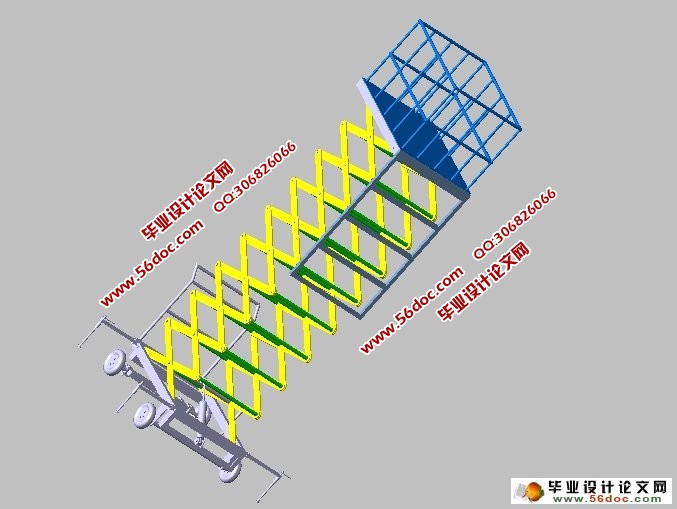
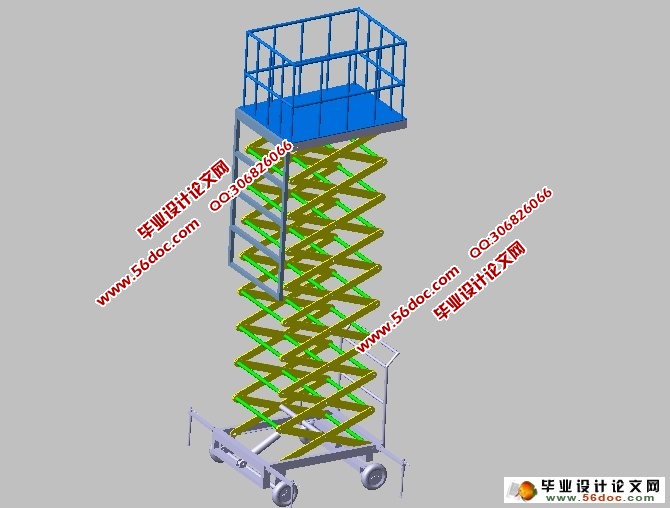
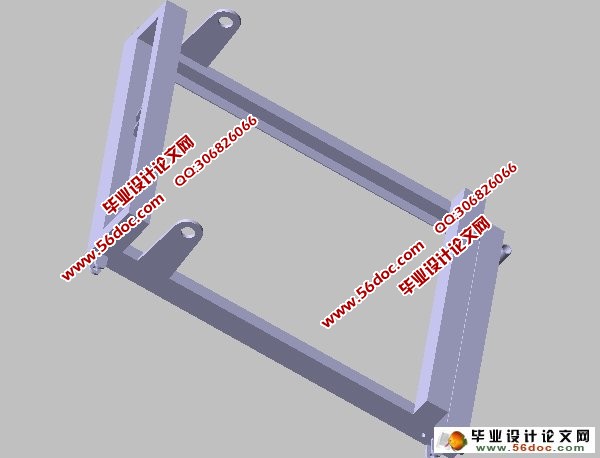
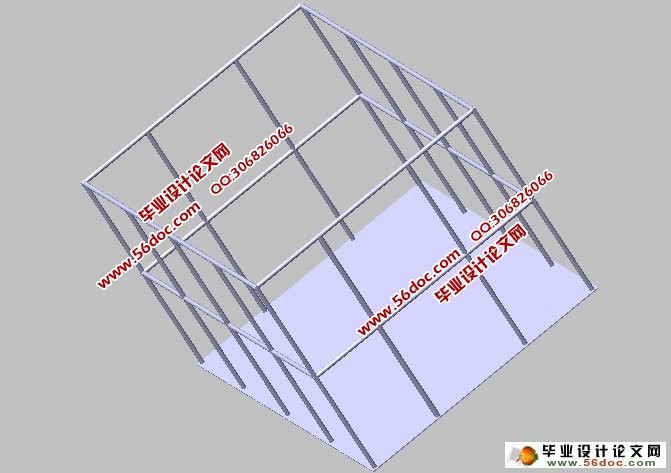
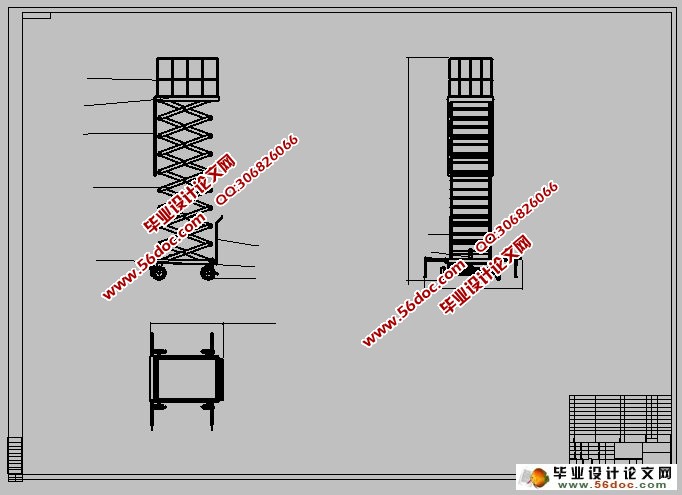
目录
摘要 I
Abstract II
前言 - 1 -
1设计背景及意义 - 1 -
1.1升降平台国内发展状况 - 2 -
1.2升降平台的分类 - 2 -
1.2.1轮齿条机构 - 2 -
1.2.2柱塞式升降机构 - 3 -
1.2.3剪叉式升降机构 - 3 -
1.2.4丝杠式升降机构 - 3 -
1.2.5链条式升降机构 - 3 -
2系统方案的确定 - 4 -
2.1确定方案 - 4 -
2.2零部件及机构的选择 - 5 -
3升降机构的分析 - 6 -
3.1剪叉机构图 - 6 -
3.1.1参数的确定 - 6 -
3.3受力分析 - 7 -
3.3.1升降平台在最低位置时的受力分析 - 7 -
3.3.2升降平台在最高位置时的受力分析 - 10 -
3.3.3槽钢受力分析 - 12 -
4强度校核 - 14 -
4.1剪叉臂的强度校核 - 14 -
4.2槽钢的强度校核 - 14 -
5系统稳定性分析 - 15 -
5.1抗倾覆稳定性 - 15 -
6液压系统 - 16 -
6.1液压系统的组成 - 16 -
6.2确定液压系统的主要结构参数 - 17 -
7总结 - 18 -
参考文献 - 19 -
|
